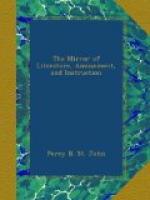MEDAL.
A handsome Medal, in bronze, of the lamented Baronet, has been published from the establishment of Mr. Parker, (medallist, and the originator of some ingenious improvements in the construction of lamps), in Argyle-place. The obverse is from Chantrey’s celebrated Bust of Sir Walter, and the reverse a graceful female figure, with the inscription, “to great men;”—designed by R. Stothard, Esq., the venerable Academician, and engraved by his son, A.J. Stothard, Esq. The profile of the obverse is encircled with a motto chosen by Sir Walter, as will be seen by the following letter; the date of which shows that the medal was submitted to his approbation some months since, together with a medal of his present Majesty. The letter is likewise treasurable,[19] as well for the writer’s opinion of the Monarch, as of the productions of his own pen:—
[19] First printed in the Literary Gazette, No. 819.
“Sir,—I would long ere now have answered your very obliging letter with the medals. That representing our Sovereign seems most beautifully executed, and is a striking resemblance. I have very little turn for imagining mottos, it being long since I read the classics, which are the great storehouse of such things. I think that a figure or head of Neptune upon the reverse, with the motto round the exergue, Tridens Neptuni sceptrum mundi. I think this better than any motto more personally addressed to the King himself than to his high kingly office. I cannot, of course, be a judge of the other medal; but such of my family as are with me think it very like. If there is any motto to be added, I should like the line
“Bardorum citharas patrio qui redidit Istro.
“because I am far more vain of having been able to fix some share of public attention upon the ancient poetry and manners of my country, than of any original efforts which I have been able to make in literature.
“I beg you will excuse the delay which has taken place. Your obliging communication, with the packet which accompanied it, travelled from country to town, and from town to country, as it chanced to miss me upon the road.
“I have the honour to be, sir, your obliged, humble servant,
“WALTER SCOTT.
“Edinburgh, 29th May.
“Samuel Parker, Esq., Bronze Works,
“12, Argyle-place, London.”
The likeness of the medal is strikingly correct; and Mr. Parker, with becoming taste, causes an autograph copy of the letter to be delivered with each medal.
The deference of the latter opinion conveyed in this letter is perhaps one of the most delightful characteristics of the genius of Sir Walter Scott,—especially if we admit the position of the writer in the Edinburgh Review, that no writer has ever enjoyed in his life-time so extensive a popularity as the Author of Waverley. His love of fame and acquisition of honourable distinction all over the world had not the common effect of making him vain. Hear, in proof, the following unassuming declaration, from the delightful autobiographic sketch to a late edition of Rokeby:—




